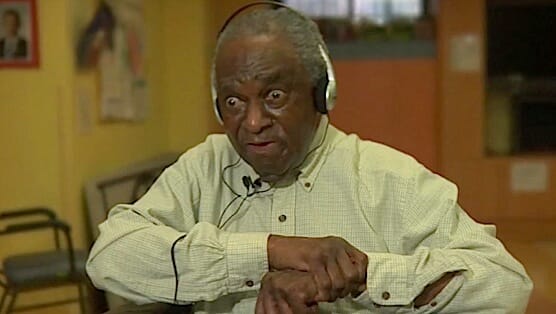
While somewhat flawed, Alive Inside is an incredibly moving film. Directed by Michael Rossato-Bennett, the documentary covers a range of subjects: dementia, the restorative powers of music, our culture’s reliance on overmedication and, most of all, the flawed way America views old age.
The film begins in the middle of an interview with an elderly African-American woman.
“What was life like when you were a little girl?” the interviewer asks.
“I forgotten so much,” the woman responds, “I’m very sorry.”?
“What have you forgotten?”
“I forgot what I used to do after I became a young lady… I’ve been here 90 years,” she continues. “And if I could remember, I would tell you.”
The interviewer invites the woman to do a little experiment with him. He proffers a set of earphones and an iPod stocked with songs from the ’30’s. He asks her to listen to them to see if the music prompts any sort of memory. She hesitantly puts the ear buds into her ears.
“It’s Louis Armstrong,” she says. After a few minutes her memories slowly start coming back. She’s able to remember sneaking off as a teenager to listen to Armstrong’s concerts. She remembers odd jobs she had when she was young. She remembers when her son’s birthday is—what started as a slow trickle becomes a raging river of recollection, “I didn’t know I could talk so much” she says, laughing.
This first moment serves as the film’s thesis: music can be an effective tool in the treatment of dementia. Dan Cohen, the film’s protagonist, champions this cause. Dan is a social worker whose life was changed when he began volunteering in nursing homes and witnessing the profound effect music has on the elderly.
Cohen’s claim is backed up by evidence and testimony both from patients and industry experts, evidence provided through a series of interviews in which people suffering from dementia and Alzheimer’s seem to wake or “quicken” as a response to their favorite music.
These illustrations are further supported by testimony from activists and doctors like Dr. Oliver Sacks, a neurologist who explains that “Music is inseparable from emotion.” Sacks adds that “it’s not just a physiological reaction. The parts of the brain that remember music and respond to music are not affected too much in Alzheimer’s disease or other dementias”
Alive Inside has its faults. It tries to cover so much that it gets muddy and sometimes a little confused. While the message first seems to be about the relationship between music and dementia, it slowly and rather haphazardly shifts into a narrative about Cohen and his struggles to influence the health care industry before again shifting into something larger still—a critique of our culture’s obsession with youth.
These changes feel a little arbitrary. While Rossato-Bennett is absolutely correct in all his claims, I have to wonder: if you have footage of people literally transforming on camera—isn’t it more effective to keep those subjects at the center of your film? Watching a patient emerge from a nearly catatonic state to sing Christmas carols and talk about his youth as a newsboy is a much stronger call to action than watching doctors explain the history of health care. The power of Alive Inside lies in the raw humanity of the old folks who find salvation in music, not the rather forced narrative Rossato-Bennett set’s up about Cohen’s inability to change the nursing home industry.
Given these criticisms, I think it’s important to recognize what this film is trying to do: raise awareness about dementia and the mistreatment of patients. Rossato-Bennett is a first-time filmmaker. He is clearly invested in his subjects—he documented Dan Cohen for three years. Though it’s true that the film tries to tackle too much, it does so because the directors and producers were more interested in conveying information than in creating a brilliant piece of cinema.
Still, Alive Inside is a movie well worth seeing. The music and flashbacks are a tad emotionally manipulative but also helpful in illustrating what a large and mostly silent class of people are going through. Dementia is not a particularly sensational subject. In our 24-hour news cycle, it often gets overlooked. However the people we encounter in this film are quiet reminders that neither old age nor mental illness should be swept under the rug.
Director: Michael Rossato-Bennett?
Writer: Michael Rossato-Bennett, George Strayton
Starring: Dan Cohen, Louise Dueno, Norman Hardie, Bill Thomas
Release Date: July 18, 2014